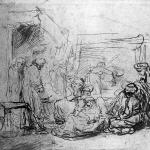
Actions speak louder than words, which is why we should be more concerned about doing what is good and just than speaking about it. This is not to say no one should speak up, because certainly it is important to help people realize what is and is not good, but our focus should be to get people to do what is good and not just know it. Sloth must be avoided. This is not to say everyone can do everything. We all have different talents and abilities, and if someone can’t do something, that is different from an unwillingness to do it. Thus, we should not be upset that the poor do not do those things which take a lot of money to do, because they do not have the means to do so. What is important is that if there is a choice between doing or speaking, doing should have preference over speech. If we do not do so, we risk making what is good appear unimportant. Likewise, if we do not act on what we say, we risk becoming hypocrites.
Certainly, it is possible to speak on the good which we know we should do, on a good which we have difficulty doing (perhaps, due to some bad habit we have developed, or some other affliction), and not be hypocrites because we are trying to do better and follow what we know is just and good. Often, in such situations, speaking out actually helps, because our words become exhortations, not just for others, but for ourselves. But the key is to get people to act, to do what is needed, and for those who speak, to live out their own words the best they can. This is why Abba Isidore of Pelusia encouraged those who listened to him to be doers, saying that it is important to combine right livelihood with right speech:
Abba Isidore of Pelusia said, ‘To live without speaking is better than to speak without living. For the former who lives rightly does good even by his silence but the latter does no good even when he speaks. When words and life correspond to one another they are together the whole of philosophy.’[1]
Those who are silent, those who do not engage words, but act on what they have heard, do far more good than those who speak words but don’t act on them. It is better to be silent and righteous than it is to speak words of wisdom and live life foolishly. For words should help inspire us to do what is right; what use are they if they do not? We should be doers of the word, lest we end up deceiving ourselves, thinking that our knowledge and wisdom is enough to make us holy (cf. Jas 1:22).
Thus, Scripture encourages us to be slow to speak. “Know this, my beloved brethren. Let every man be quick to hear, slow to speak, slow to anger, for the anger of man does not work the righteousness of God” (Jas. 1:19-20 RSV). For if we speak without doing, we speak without experience, and that means, without knowing, and so we are liable to get things wrong and let the worst aspects of ourselves, such as our anger, overcome our good intentions and hinder any good which we might have promoted. It is better to be silent than it is to constantly speak, for in that way, we keep out of trouble (cf. Prov. 21:23). Indeed, as actions speak louder than words, so our actions will serve, more than words, in revealing the truth (even as God’s actions, God’s energies, serve to reveal God to us), and thus, those who are foolish, those who speak erroneously because they lack the experience necessary to speak, will find their actions will put them to shame, as their words will be undone by their deeds (cf. 1 Ptr. 2:15).
Yet, we will speak, and when we speak, our words should promote justice and grace. Justice, for those in need, and grace, so that all the wounds which have come as a result of sin can be healed. We, who know and experience the healing powers of grace in our lives, should be graceful in our speech to others, working to bring peace and healing to all. We should speak of the ways of grace, that is, the ways of love. And it is with love, and the dictates of love, grace is able to merge with justice. Those who embrace love as their way of life will desire justice for their beloved, and not just any kind of justice, but restorative justice. If we are filled with love, we will want those who have suffered injustice to be lifted up and promoted. “Open your mouth for the dumb, for the rights of all who are left desolate. Open your mouth, judge righteously, maintain the rights of the poor and needy” (Prov. 31:8-9 RSV). Insofar as justice is necessary, it is necessary that we do more than speak about justice. Our actions must be geared towards its promotion, actively bringing grace to it, so that through grace, justice can transform the world. If we do this, if we act on justice, we will find our words can be and will be authentic. We can borrow the words from others, and in doing so, perhaps do some good, but it is better to speak out of experience, for then we will be able to speak with the kind of prudence which understands the needs of the moment instead of speaking with a kind of legalism which does not know how to effectively deal with the differences found in each particular situation.
“Let your light so shine before men, that they may see your good works and give glory to your Father who is in heaven” (Matt. 5:16 RSV). Our light is the good which we do. Our light is itself our participation in and reflection of the divine light which is within us. The more we cooperate with it, the more we join ourselves with it, the more we will act in the world in a way as to reveal the glory of the kingdom of God. And that glory is the glory of universal love, a love which elevates and promotes justice and grace for all, especially for those who have otherwise been unjustly neglected or abused. We are to shine the light into the world. Let us, therefore, speak loudly by our actions, and if necessary, with our words.
[1] The Sayings of the Desert Fathers. trans. Benedicta Ward (Kalamazoo, MI: Cistercian Publications, 1984), 98 [Saying of Isidore of Pelusia 1].
Stay in touch! Like A Little Bit of Nothing on Facebook.
If you liked what you read, please consider sharing it with your friends and family!













